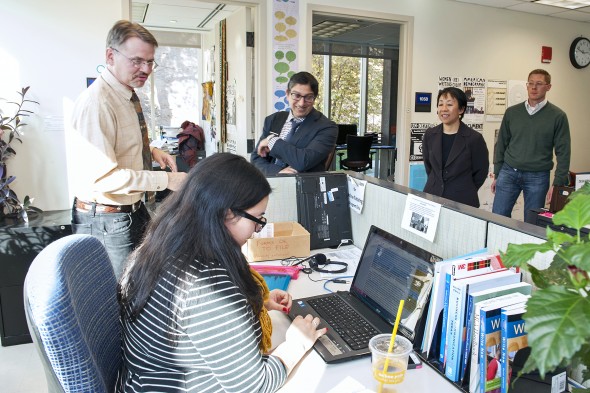White House adviser ‘impressed’ with student initiatives

White House adviser Akil Vohra (center) visits with senior Hannah Aztlan, a tutor at the Writing Center, Vainis Aleksa, Writing Center director (left), and Karen Su (right), director of UIC’s AANAPISI program. Photo: Roberta Dupuis-Devlin/UIC Photo Services
It’s up to universities like UIC to help President Obama achieve his vision, says White House adviser Akil Vohra.
“From the president’s perspective, we want to make sure that by 2020, we have the highest proportion of college graduates in the world,” said Vohra, senior adviser at the White House Initiative on Asian Americans and Pacific Islanders. “That goal is not going to be met unless we target first-generation, low-income communities.”
Vohra was on campus Friday to meet with UIC students, faculty and administrators and learn about UIC’s efforts as an Asian American and Native American Pacific Islander-Serving Institution (AANAPISI).
UIC was designated an AANAPISI by the U.S. Department of Education in 2008, meeting the requirements of having at least 10 percent of its student population identify as Asian American or Pacific Islanders, with at least half of the institution’s degree-seeking students eligible to receive federal Pell grants.
Vohra visited the Asian American Resource and Cultural Center, the Asian American Studies Program and the Writing Center; sat in on an AARCC Lunchbox student discussion about the concept of love between Asian parents and their children; and talked with UIC administrators and faculty members.
“I’m very impressed,” Vohra said. “It’s great to see students who are involved and faculty and administrators who understand the community.
“The Asian American Resource and Cultural Center provides a great environment for students to come together and have discussions. It provides a home away from home.”
UIC is the only university in the Midwest to receive designation and funding from the AANAPISI program, said Karen Su, principal investigator and project director of the UIC initiative.
“It really highlights the important role that UIC is playing in terms of supporting Asian American and Pacific Islander students in the Midwest,” said Su, clinical assistant professor of Asian American studies.
“A lot of times, people have the misconception that Asian American students do not need any support — that they’re all doing well academically and are economically well off, and at UIC, that’s not really true. Our Asian American students are very much like all students at UIC — we have a high number of low-income, first-generation college students.”
UIC should share its best practices for supporting Asian American and Pacific Islander students with the rest of the country, Vohra said. According to the U.S. Census data, the nation’s Asian American population “is only going to increase by leaps and bounds,” he said. States such as Arkansas, Texas and Louisiana, which typically had a small population of Asian Americans, are seeing that demographic grow, he said.
“We want to make sure that the experiences that UIC has had with these populations is being shared, and that’s where UIC can play a critical role,” Vohra said. “We know that more is being asked of our institutions, but schools and universities are doing it with less. We want to make sure that although we recognize the capacity constraints, we are highlighting the federal funds that are available.”
UIC received two AANAPISI grants: a five-year, $1.86 million grant through fiscal year 2015 and a five-year, $2 million grant through fiscal year 2016. The first award provides student support in recruitment, retention and graduation by enhancing activities for the cultural center and academic program. The second funds academic and writing skills development, college preparation and career advancement.
“It’s very unusual to have two grants,” Su said. “We’re serving Asian American students in the Chicago area in a significant way.”
The grants fund programs that are available to all UIC students — not just Asian Americans, Su said. Funding supports UIC’s first-year writing program, Writing Center initiatives, student support programs at the Asian American Resource and Cultural Center and initiatives in the Asian American Studies Program, which are open to all students.
“Our AANAPISI funding benefits the campus as a whole,” Su said.
The grant also funds a new college visit day, she said, with students recruited from area high schools, youth groups and cultural centers.
“When the students arrive on campus, it’s usually a very multiracial group,” she said. “They are the kinds of diverse students we want to see come to UIC and continue to contribute to our campus.”
Categories
Topics
Asian American, diversity, Pacific Islander, student success, underrepresented minorities
